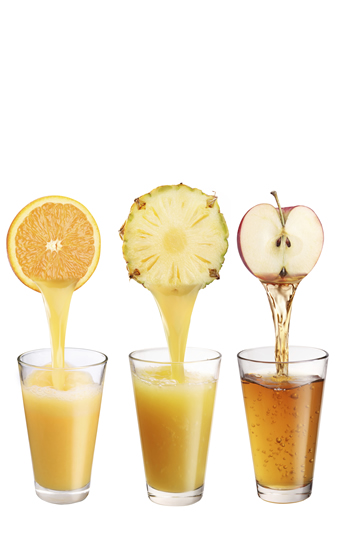
Juices
Fruit juices are a refreshing and appetizing way to drink fruit . With them we guarantee a not inconsiderable contribution of water, vitamins and minerals . And they are easy to take at all ages.
The fruit juices, pleasant and very nutritious , provide us with water, vitamins and minerals that our body needs to stay healthy.
However, when squeezing the fruit, the fiber they provide is lost and vitamins are lost if the juice is not consumed immediately.
They are a healthy and valid alternative to fruit consumption by providing the same nutrients as the fruit from which they come and are the ideal drink for children, sick people or the elderly with chewing problems who consume little fruit.
However, they should not be replaced frequently by whole pieces of fruit as the juices do not stimulate chewing.
Fresh juices, homemade and immediate consumption, provide us with a greater amount of vitamins and minerals than those obtained industrially. However, the current production processes, increasingly improved, allow juices of excellent quality to appear on the market that preserve practically all the vitamins and minerals of the fruit from which they come.
What types of juices do we find on the market?
In supermarkets we can find a wide and varied offer of related products that are included under the name of juices or nectars and that differ according to the ingredients or production processes used.
- Fruit juice : It is the juice or fruit juice obtained from healthy fruit, ripened by mechanical processes, susceptible to fermentation, but not fermented, which presents the color, aroma and flavor of the fruit from which it comes.
- Pure juice or natural juice : It is the juice obtained from fresh fruit and stabilized by authorized heat treatments to guarantee its conservation.
- Concentrated fruit juice : It is obtained from fruit juice that has had a good part of its water content removed by some physical procedure.
- 100% juice : It is the product made from the concentrate, puree or mixture of both, 100% fruit, reconstituted with water and aromas.
- Dehydrated fruit juice : It is obtained after eliminating almost all of the water that constitutes it through physical procedures. Its water content must not exceed 10%.
- Fruit nectar : It is an unfermented product, but fermentable, obtained by adding water and sugars or syrups to fruit juices, concentrated fruit juice, fruit puree or concentrated fruit puree. Its labeling will include the minimum content of juice or puree and can contain up to 20% added sugar or honey or any other sweetener (nectar without sugar).
- Enriched juice : It is the juice 100% enriched with vitamins and minerals or other nutrients.
What kinds of nutrients do juices give us?
Fruit juices are a good source of vitamins and minerals , as well as providing us with a large amount of water. Fruit juices contain the same nutrients as the starting fruits except for fiber.
They are especially rich in vitamin C , especially in the case of citrus juices. A freshly squeezed orange juice gives us 50 to 60 mg / 100g Vitamin C . However, the content of said vitamin is largely lost during industrial manufacturing processes as well as due to the effect of temperature or storage time.
Likewise, they provide minerals such as potassium, calcium, phosphorus and magnesium , as well as moderate amounts of iron, copper, zinc and manganese . However, its mineral contribution will depend on the fruit or fruits from which they come.
They provide carbohydrates , simple and easily absorbed from the fruit or the sugar added in its preparation. This causes its energy content to vary considerably. In general, its caloric content ranges mostly between 40 and 50 kcal / 100 mL, so a glass of juice provides about 100 kcal.
However, juices lack the fiber provided by fruits consumed as is and lose their vitamins if not consumed immediately.
When are juices indicated?
Fruit juices are ideal in the case of children and the elderly with chewing difficulties, as well as in convalescents or anorexic people since their pleasant taste facilitates their ingestion.
They are also indicated in athletes who require a greater energy intake as well as vitamins and minerals.
The juices, appetizing and refreshing, allow us to cover the daily needs of vitamins and minerals that our body needs, in addition to providing the healing properties of the fresh foods they contain.
Learn more about juices
- To make a juice at home, you have to choose healthy fruits and in their optimal state of ripeness that should be washed or peeled properly before being blended or squeezed. The blender offers us a fast and efficient way to obtain juices.
- Once made, it is best to consume them immediately so that they do not lose their nutritional value, flavor and color.
- It is important to maintain the intake of 5 pieces of fruit and vegetables a day . However, the consumption of fruit juices should not displace water as a habitual drink since this could contribute to obesity in children.




















+ There are no comments
Add yours